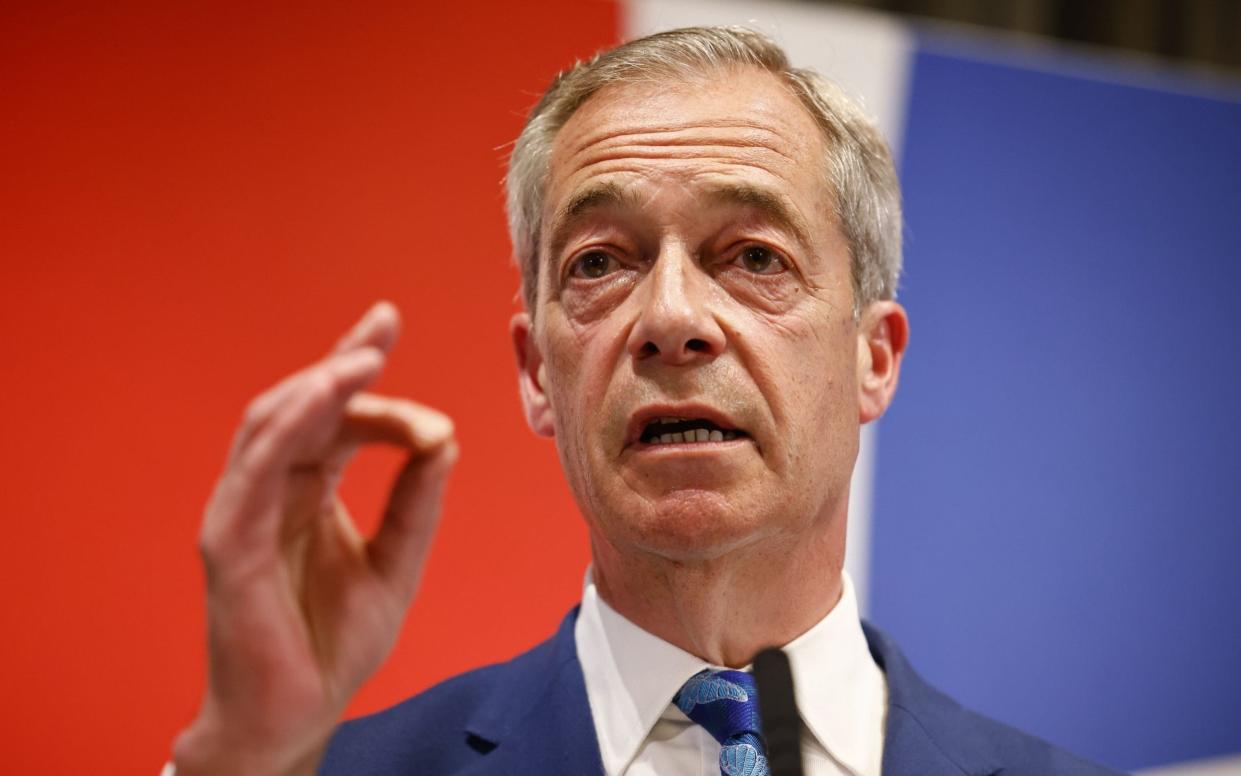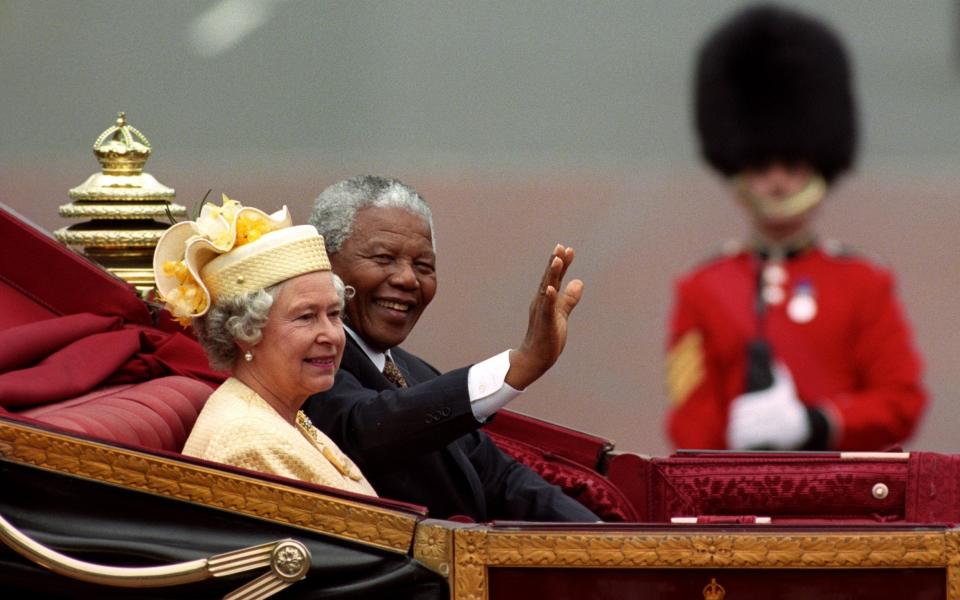Letters: Hope that Nigel Farage can shake the complacency from British politics

SIR – I have just watched Nigel Farage announce that he is running for Parliament, and I’m delighted.
At last there will be an alternative to the non-choice between Labour and the Conservatives, whose approach is simply to carry on as before.
What was profoundly depressing, though, was some of the hostile media questioning after Mr Farage’s speech, seeking to make him look bad for changing his mind rather than asking him about his policies and plans for the future.
The establishment still doesn’t get it. Mr Farage and Reform UK represent ordinary people. They’ve got my vote. Seatbelts on.
Alison Levinson
Hastings, East Sussex
SIR – Nigel’s back. He just might have saved the country.
Stan Kirby
East Malling, Kent
SIR – If Nigel Farage becomes an MP he will be an important and influential voice for the centre-Right in Parliament.
A crushing defeat for the Conservatives will mean he plays a leading role, alongside the rump of Tory MPs, in providing opposition to a Labour government. This would certainly put the cat among the Westminster pigeons.
David Saunders
Sidmouth, Devon
SIR – I once had respect for Nigel Farage, but he has been an apologist for Vladimir Putin and would abandon Ukraine to servitude.
He won’t be getting my vote, any more than Rishi Sunak or Sir Keir Starmer will.
John Kennedy
Hornchurch, Essex
SIR – Why do so many politicians today have so little political nous? Rishi Sunak campaigns joyously as he sees the end is in sight, but still does not understand that, by making attractive promises he will never have to deliver, he could reduce Labour’s majority by at least half.
As a parting gift, therefore, let’s have commitments to abolish inheritance tax, cut corporation tax, leave the ECHR, remove the tourist tax, semi-privatise the NHS, build more prisons and offer tax rebates to parents choosing private schools.
John Bunker
Olney, Buckinghamshire
SIR – Rosemary Marshall (Letters, June 3) accuses me of being “irresponsible” by encouraging people to invalidate their ballot papers.
How is she going to vote if she doesn’t trust any of the candidates? It is far more irresponsible to vote for someone you don’t think can do the job than to let it be known that you are not apathetic, just very unhappy about the way things are.
Margaret Humphreys
Wadebridge, Cornwall
Labour’s VAT raid
SIR – As a former chair of governors at Reigate Grammar School, I am disappointed by the lack of empathy and foresight shown by Sir Keir Starmer – an old boy – in his VAT attack on private schools.
His policy will deny present-day students the opportunities he enjoyed. The greatest impact will be felt not by the privileged or super-rich, but by the pupils whose parents struggle to finance an appropriate education for them, especially those with special needs.
At present there is widespread provision of bursaries to fund places for children from poorer backgrounds. That funding is now likely to dry up, reducing opportunities for working-class families – just as Labour’s decision to scrap the Assisted Places Scheme did some years ago. We are already starting to witness the chaos that Sir Keir’s policy will cause, with evidence of sizeable numbers looking for state-sector places that do not exist in the areas where displacement from the private sector is occurring.
Speaking after the announcement of the election, Sir Keir asked if we could trust Labour. It is clear that, in the matter of education, we cannot. And if the party cannot be trusted with education, why should we trust it to run the economy efficiently, establish an effective defence policy or deal with the challenges of housing, justice and immigration?
Past Labour governments have created systems that have led to the wrecking of occupational pensions, given us cliff edges in our tax and child benefit systems that disincentivise ambition, and crippled us with stamp duty changes that have stifled the housing market. The introduction of VAT on private school fees represents another use of Labour’s wrecking ball.
Alan Walker
Leatherhead, Surrey
Unsung D-Day heroes
SIR – A great deal is being written about D-Day and the men, women, aircraft, tanks and warships involved.
Seldom mentioned are the amphibious ships, in particular the Tank Landing Craft Mark 4, and their crews. More than 700 of these craft took part on June 6, crewed by some 9,000 sailors, and without them the armies would never have reached France, let alone gone on to Berlin.
These vessels were slow and not very beautiful but they did everything that was required of them, delivering their loads of men, tanks and trucks directly to the beaches, often under heavy fire. They deserve to be remembered.
David Miller
Newton Abbot, Devon
Footballers’ lives
SIR – I write as chaplain to Scunthorpe United Football Club, now plying their trade in the National League North.
I’m always concerned for player welfare and wellbeing, both physically and mentally, and the prospect of the top clubs, both here and abroad, adding to their already busy schedule with a 32-team Club World Cup (Sport, May 31) appals me.
There will be precious little rest time between one season and the next, which will begin with already tired personnel. Supporters will rightly feel aggrieved if their star players are injured during this new competition, which is in addition to the newly extended European Champions’ League.
Surely the time has come to limit the playing time of the top players in a single season. As always, it comes down to money.
Rev Alan Wright
Barton-upon-Humber, Lincolnshire
Running for president
SIR – Judy Harckham (Letters, June 3) makes a valid point about the poor quality of American presidential candidates.
Sadly, of the 335 million people in the US population, I suspect very few have the money behind them to run a campaign.
Money makes its way to the top, no matter the morals.
Kirsty Blunt
Sedgeford, Norfolk
SIR – Both Sir Keir Starmer and Rishi Sunak appear to be honest and sincere.
Perhaps we should be more appreciative of the fact that, whoever wins the election here, it is unlikely we’ll be subjected to the self-serving shenanigans associated with Boris Johnson and Donald Trump.
Patrick Miller
Hartlepool, Co Durham
Vital tourists
SIR – I don’t agree that “tourists are beastly” (Comment, June 3).
We live in Haworth, which is awash with them. They are the main engine of the economy. It’s thanks to them that we have so many pubs, restaurants, cafes and high-quality shops; they sustain our railway service and ensure an excellent bus service. They are usually nice people, too.
David Pearson
Haworth, West Yorkshire
SIR – P Farmer (Letters, June 3) accuses local people of selling their properties to second-home owners or holiday let landlords. In fact, many local vendors here have been desperate to sell to people who will live in the town.
The purchasers are aware of this and, unfortunately, make false assurances. Once the sale is made, there is no going back, but the remaining locals know of these broken promises.
A V Lofts
Salcombe, Devon
Epic’s voyage
SIR – After a two-year sojourn in the Antarctic with the British Antarctic Survey, a friend and I jumped ship in Montevideo to meander slowly home through South America.
For reading matter, we settled on two volumes of the paperback edition of War and Peace (Letters, June 1), tearing the book into sections for the second reader and then, on the Amazon, using it as lavatory paper.
I still regret such cavalier treatment of a classic, but it did not mar my appreciation of Russian authors.
Tony Keeley
Reading, Berkshire
The damage done to Nelson Mandela’s legacy

SIR – I lived and worked in South Africa from 1969 to 1971, when Apartheid was probably at its worst. I would go to work on a “white” bus and saw racially motivated beatings.
Nelson Mandela was incarcerated on Robben Island. He was released in 1990 after serving 27 years. He bore no grudge against anyone.
He paid a state visit to Britain in 1996 and was received by the late Queen Elizabeth II. This was the beginning of a deep friendship between them, and the Queen thought he was a remarkable man.
How sad he would be that the African National Congress (ANC) has lost its grip on power for the first time in 30 years (report, June 3) as a result of economic mismanagement and corruption. Mandela’s ambition was for white and black people to live in harmony, work together to build South Africa and be an example to the rest of Africa. The ANC has failed to achieve this.
Rosemary Corbin
Zeals, Wiltshire
Battling bureaucrats to get potholes repaired
SIR – Having recently returned from driving around northern France and Belgium (Letters, June 3), I must say that I felt I had never actually left the UK. The roads in towns and the countryside were full of potholes and badly filled repairs. When we commented on this to our hostess, she agreed that they were dreadful. She added that she had informed the local mayor and was told, as in the UK, that the holes weren’t deep enough.
Undaunted, she had taken pictures and gone in to complain. Again she was told there would be no repairs – and so they remain.
There is clearly a mindset shared by bureaucrats the world over.
Ian Wallace
Whitley Bay, Northumberland
SIR – French roads are, as Anthony Cutler says (Letters, June 3), a delight to drive on, both in terms of surface quality and the amount of traffic – to say nothing of French driving, in particular lane discipline.
However, for a country with a similar population to ours, France has double the land area of the UK, and the road network is twice as big, meaning our roads have to work a lot harder.
Margaret Forbes
London E1
SIR – Anthony Cutler extols France’s double-decker trains and asks why the idea is not considered here.
British Rail did once have double-decker commuter trains running from the South East into London. I saw an example in a railway museum in the 1970s. They were just as crowded as current trains, and presumably unpopular, as they were removed from service.
Jeannette Meyers
Ashford, Kent
Letters to the Editor
We accept letters by email and post. Please include name, address, work and home telephone numbers.
ADDRESS: 111 Buckingham Palace Road, London, SW1W 0DT
EMAIL: dtletters@telegraph.co.uk
FOLLOW: Telegraph Letters @LettersDesk
NEWSLETTER: sign up to receive Letters to the Editor here

